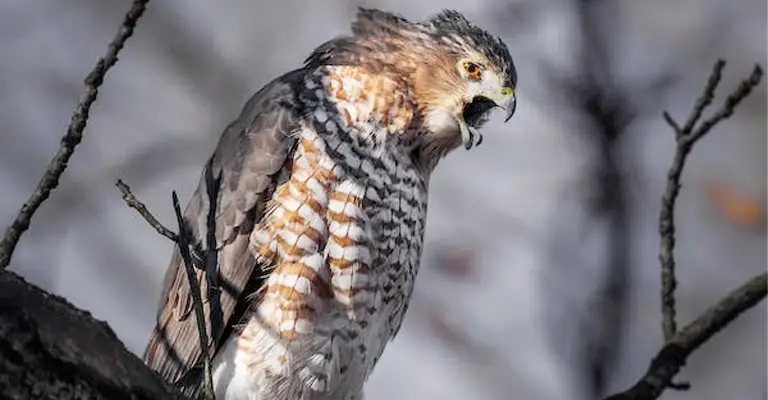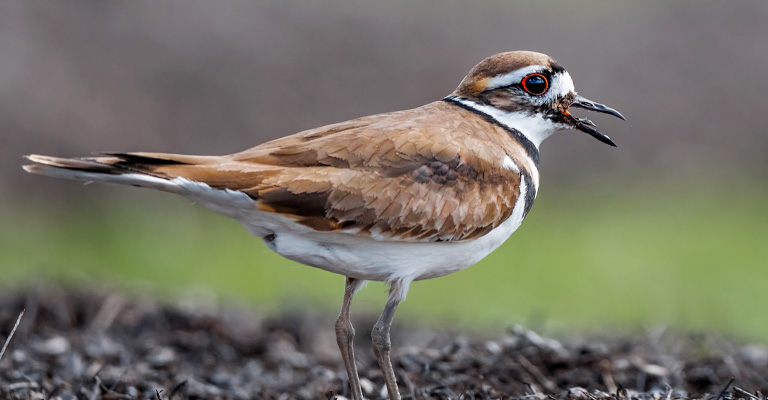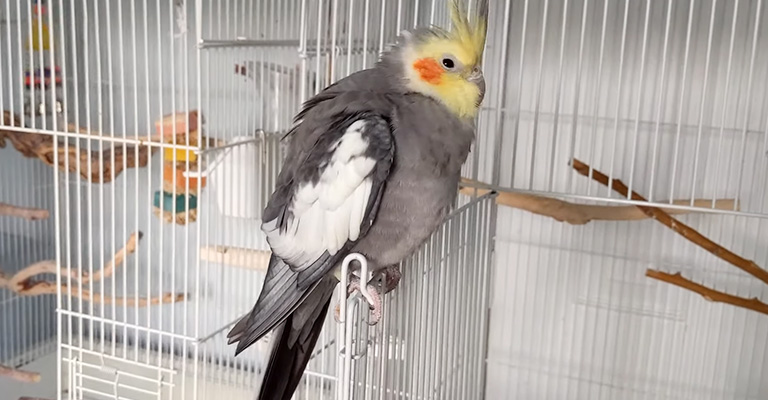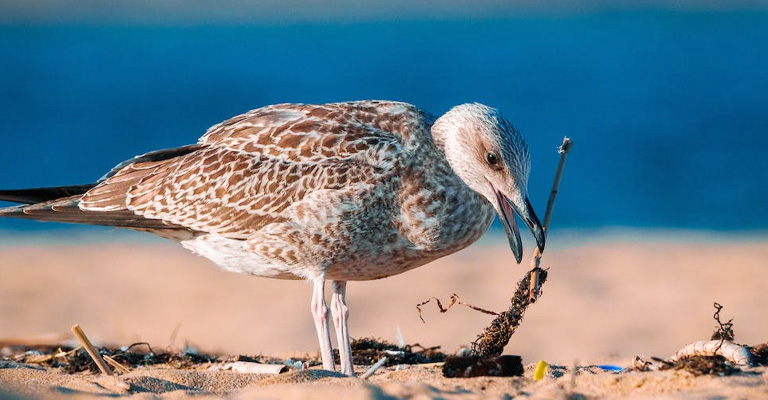Birds are known for their diverse and captivating vocalizations, each species having its unique repertoire of calls and songs.
Occasionally, you may come across a bird that produces a gurgling sound, which can be intriguing and raise questions about its origin and meaning.
This unique vocalization, reminiscent of water flowing through a hidden stream, adds an enigmatic layer to the avian world’s diverse array of calls.
In this article, we will explore bird makes a gurgling sound – reasons and some possible explanations.
The specific reasons for a bird making a gurgling sound can vary depending on the species and context.
You must consider other accompanying behaviors and environmental factors when interpreting the meaning behind a bird’s vocalizations.
Understanding these factors can help us appreciate the fascinating behaviors and vocalizations of our avian friends. Let’s dive in!

Bird Makes a Gurgling Sound – Reasons
There could be several reasons why a bird might make a gurgling sound. Here are a few possibilities:
Vocalization
Some bird species, such as pigeons or doves, have a unique vocalization that can sound like gurgling. This is a natural part of their communication repertoire.
Respiratory Issues
Gurgling sounds in birds can sometimes indicate respiratory problems, such as an infection or congestion. If the bird is also displaying other signs of illness, such as difficulty breathing, coughing, or sneezing, it may be best to consult a veterinarian.
Regurgitation
Certain bird species, like parrots, may make gurgling sounds as part of their regurgitation behavior. This behavior is often associated with courtship or bonding rituals.
Digestive Issues
Gurgling sounds can also be related to digestive problems in birds. If a bird has consumed something that is causing discomfort or if it has an underlying digestive issue, it may produce gurgling sounds.
Nesting Behavior
Some bird species, like the American Woodcock, produce gurgling or bubbling sounds as part of their courtship or territorial displays. These sounds are often associated with attracting a mate or defending their nesting territory.
Throat or Beak Issues
Birds with throat or beak problems, such as an injury or infection, may produce gurgling sounds while trying to vocalize. These issues can affect their ability to produce normal sounds, resulting in gurgling or distorted vocalizations.
Water-related Activities
Certain water birds, like ducks or geese, may make gurgling sounds while swimming or diving. These sounds can be a result of water splashing or air being expelled from their feathers.
Age-related Vocalizations
Young birds that are still developing their vocal abilities may produce gurgling sounds as they practice and refine their vocalizations. These sounds often improve as the bird matures.
Mimicry
Some bird species, such as parrots or starlings, are known for their ability to mimic various sounds, including gurgling noises. If you hear a bird making gurgling sounds, it could be imitating sounds it has heard in its environment.
Note that without more specific information about the bird species and its behavior, it can be challenging to pinpoint the exact reason for the gurgling sound.
If you are concerned about a particular bird, it’s always a good idea to seek advice from a veterinarian or an avian expert who can provide more accurate guidance.
What to Do If Your Bird Is Making a Gurgling Sound?

If your bird is making a gurgling sound and you’re concerned about its health, here are some steps you can take:
Observe the Bird
Pay attention to any other accompanying symptoms or changes in behavior. Note if the bird is eating, drinking, or behaving differently than usual. This information can be helpful when seeking professional advice.
Isolate the Bird
If you have multiple birds, it’s a good idea to separate the bird making the gurgling sound from the others. This can help prevent the potential spread of any contagious diseases.
Contact a Veterinarian
Reach out to an avian veterinarian or an avian specialist as soon as possible. They will have the expertise to assess the situation and provide appropriate guidance. Describe the bird’s symptoms, including the gurgling sound, and follow their instructions for further evaluation or treatment.
Provide a Comfortable Environment
Ensure that the bird has a warm, quiet, and stress-free environment. Make sure it has access to fresh water and a balanced diet suitable for its species. Avoid exposing the bird to drafts or sudden temperature changes.
Avoid Self-Diagnosis and Treatment
It’s important not to attempt any home remedies or administer medications without professional advice. Improper treatment can potentially worsen the bird’s condition or be harmful.
Signs of Tracheal or Syringeal Disease in Birds

Tracheal or syringeal diseases in birds can manifest in various ways. Here are some signs that may indicate tracheal or syringeal disease:
Respiratory Distress
Birds with tracheal or syringeal disease may exhibit difficulty breathing, rapid or labored breathing, or open-mouth breathing.
Abnormal Vocalizations
Changes in the bird’s voice or vocalizations, such as wheezing, raspy sounds, or a loss of voice, can be indicative of tracheal or syringeal issues.
Coughing or Sneezing
Birds with respiratory problems may cough or sneeze frequently. These actions can be accompanied by discharge from the beak or nostrils.
Gurgling or Rattling Sounds
Gurgling or rattling sounds during breathing can suggest the presence of mucus or fluid in the respiratory system.
Reduced Activity or Lethargy
Birds with tracheal or syringeal disease may become less active, show a decrease in appetite, or appear generally lethargic.
Tail Bobbing
Excessive movement of the tail up and down with each breath can be a sign of respiratory distress.
Fluffed Feathers
Birds may fluff up their feathers in an attempt to conserve body heat or due to discomfort caused by respiratory issues.
Cyanosis
In severe cases, the bird’s mucous membranes, such as the beak or feet, may appear bluish or purplish due to a lack of oxygen.
It’s important to note that these signs can also be indicative of other health conditions, so it’s crucial to consult with an avian veterinarian for an accurate diagnosis and appropriate treatment.
They will be able to perform a thorough examination and recommend further tests or treatments based on the specific symptoms and condition of the bird.
How to Diagnose a Bird When It’s Making a Gurgling Sound?

Diagnosing the cause of a bird’s gurgling sound requires a thorough examination by an avian veterinarian. Here are some steps they may take to diagnose the underlying issue:
Physical Examination
The veterinarian will conduct a comprehensive physical examination of the bird, including observing its behavior, breathing pattern, and overall appearance. They may also check for any abnormalities in the beak, eyes, feathers, or other external signs.
Medical History
Providing the veterinarian with a detailed medical history of the bird, including any recent changes in diet, environment, or exposure to potential toxins, can help in the diagnostic process.
Diagnostic Tests
Depending on the veterinarian’s initial assessment, they may recommend additional diagnostic tests to further evaluate the bird’s condition. These tests may include:
- Blood tests: Blood work can provide valuable information about the bird’s overall health, including any signs of infection or inflammation.
- Radiographs (X-rays): X-rays can help identify any abnormalities in the bird’s respiratory system, such as lung infections or air sac issues.
- Endoscopy: This procedure involves using a small camera to visualize the bird’s respiratory tract and identify any abnormalities or obstructions.
- Cultures or swabs: Collecting samples from the bird’s respiratory tract or oral cavity can help identify specific pathogens or bacteria causing the gurgling sound.
- Cytology: Analyzing samples of respiratory secretions or discharge under a microscope can provide insights into the presence of abnormal cells or infectious agents.
Consultation with Specialists
In complex cases, the avian veterinarian may consult with or refer the bird to a specialist, such as an avian internist or an avian radiologist, for further evaluation and expertise.
Based on the findings from the examination and diagnostic tests, the veterinarian will be able to provide a more accurate diagnosis and recommend appropriate treatment options to address the underlying cause of the gurgling sound.
FAQs
Yes, a gurgling sound in a bird can be indicative of a respiratory infection. Respiratory infections in birds can be caused by bacteria, viruses, or fungi, and they can lead to symptoms such as gurgling sounds, difficulty breathing, coughing, sneezing, and nasal or ocular discharge.
Yes, it is normal for certain bird species to make gurgling sounds during courtship or mating rituals.
These vocalizations are often part of their natural behavior and are used to attract a mate or establish territory. Examples include the cooing sounds made by pigeons or doves during courtship displays.
Yes, a bird’s gurgling sound can sometimes be associated with digestive issues. If a bird has consumed something that is causing discomfort or if it has an underlying digestive problem, it may produce gurgling sounds.
Other signs of digestive problems may include changes in appetite, regurgitation, diarrhea, or abnormal droppings.
If your bird is making gurgling sounds while swimming, it is likely a normal behavior associated with water-related activities.
Certain water birds, like ducks or geese, may produce gurgling sounds due to water splashing or air being expelled from their feathers.
Yes, a bird’s gurgling sound can be a sign of a throat or beak injury. Birds with throat or beak problems, such as an injury or infection, may produce gurgling sounds while trying to vocalize.
These issues can affect their ability to produce normal sounds, resulting in gurgling or distorted vocalizations.
Bottom Line
The gurgling sound produced by a bird can have various explanations and reasons. It could be a part of their natural vocal repertoire, a form of communication, or even a result of environmental factors.
By observing the bird’s behavior, considering its species, and taking into account the context in which the sound is heard, we can gain a deeper understanding of why birds make gurgling sounds.
Remember, the world of avian vocalizations is vast and diverse, and each sound adds to the beauty and intrigue of our feathered friends.
By examining the diverse avian species capable of producing such sounds and cross-referencing their behaviors, experts strive to unravel the intricate tapestry of avian vocalizations.
So, the next time you hear a bird making a gurgling sound, take a moment to appreciate the wonders of nature and the fascinating ways in which birds communicate.